初中英语情态动词
初中英语——情态动词
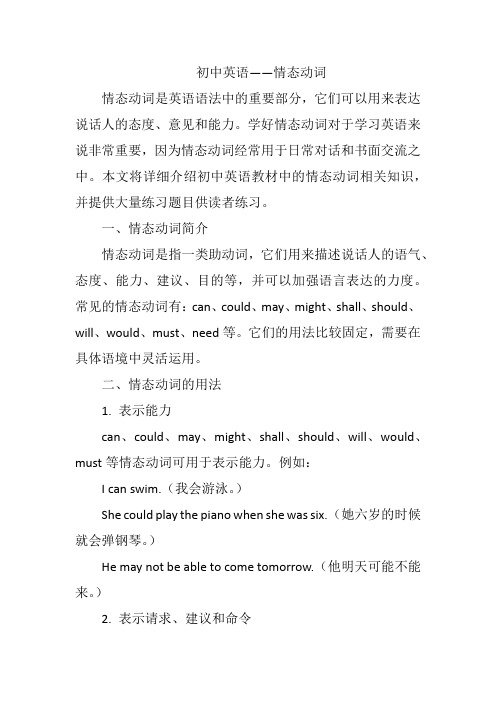
初中英语——情态动词情态动词是英语语法中的重要部分,它们可以用来表达说话人的态度、意见和能力。
学好情态动词对于学习英语来说非常重要,因为情态动词经常用于日常对话和书面交流之中。
本文将详细介绍初中英语教材中的情态动词相关知识,并提供大量练习题目供读者练习。
一、情态动词简介情态动词是指一类助动词,它们用来描述说话人的语气、态度、能力、建议、目的等,并可以加强语言表达的力度。
常见的情态动词有:can、could、may、might、shall、should、will、would、must、need等。
它们的用法比较固定,需要在具体语境中灵活运用。
二、情态动词的用法1. 表示能力can、could、may、might、shall、should、will、would、must等情态动词可用于表示能力。
例如:I can swim.(我会游泳。
)She could play the piano when she was six.(她六岁的时候就会弹钢琴。
)He may not be able to come tomorrow.(他明天可能不能来。
)2. 表示请求、建议和命令shall、should、will和would等情态动词可以用于表示请求、建议和命令。
例如:Shall we go to the cinema tonight?(我们今晚去看电影怎么样?)You should take the medicine three times a day.(你应该每天服三次药。
)Would you please open the window?(你能帮我开下窗户吗?)3. 表示可能性may、might、could和can等情态动词可以用于表示可能性。
例如:It may rain tomorrow.(明天可能会下雨。
)He could be at home.(他可能在家。
)4. 表示推测may、might等情态动词可用于表示推测。
初中英语情态动词讲解

情态动词(一)情态动词的定义: 情态动词表示说话人对某一动作或状态的态度。
(二)情态动词的特点1. 情态动词有一定的词义。
2. 情态动词不能单独做谓语,它必须和其他动词的原形一起构成谓语。
3. 情态动词没有人称,数的变化。
(三)情态动词的结构和意义1.情态动词的基本句型肯定句:主语+情态动词+动词原形+......否定句:主语+情态动词+not+动词原形+......疑问句:情态动词+主语+动词2. 情态动词的意义must“必须”;can/could“能,会”;may/might “可以”;should“应该”;would“愿,要”;have to“不得不”;need“需要”used to do 过去常常做.... Had better do sth 做好做某事(四)情态动词的基本用法1.can (could主要指过去时间)1)肯定句中,表示人或物本身所具有的能力,意为“能,能够,会” :Two eyes can see more than one. / I can swim very well.2)否定和疑问句中,表示可能(理论上或是逻辑判断,could 比can的可能性更小)He can’t (couldn’t) have enough money for a new car.Could it be Henry ?3)疑问中,表示请求、允许:(could表示比can的语气更委婉客气)--Can (Could) you lend me a hand? 帮我一把好吗?2. may (might)1)疑问句中,表允许,或者征求意见。
(might既指过去时间,也可指现在时间,语气比may更委婉)。
在回答May / (Might) /can ( could )I .....? 肯定回答一般用:yes ,you may /can , 或Yes, please. / Certainly./Sure./Of course. ;否定回答:用:No ,you may not / No ,you can’t / No ,you must not(mustn’t)(禁止)/ No, you had better not(最好别)2)肯定句中,may表可能, 但可能性不如can肯定,(might既可以指过去时间,也可以指现在时间,但语气上不如may 肯定)。
英语情态动词(精华)

09徐州
—Look! Jack is crossing the street. —It ______ be him. He’s in Beijing and C he won’t be back until Friday. A. may B. can C. can't D. mustn't
(不可能是他,因为他在北京,直到周五 才回来,这是一个事实。)
may 和might在这方面的语气较弱、没有 那么肯定,表示说话人根据自己的主观意 断而进行的猜测,一般地说没有足够的客 观依据。其中,might的语气更弱一些。 例如:
As a football fan, he must watch the football match, --Brazil vs. France ,on TV at present. (说话人料定自己的推测不会有错:哪有足球迷 不看巴西队与法国队比赛的道理。)
二.牛津版教材中在Grammar出现的情 态动词: 7A Unit 6: 用can, may谈论许可; 7B Unit 5: 用can/could表达现在和过去的能力; 用can/could表达现在和过去的可能性; 9B Unit 1: 用can,could,may,might谈论请求和许可;
三. 情态动词可表达的不同含义: 1)在表示“可能性”方面 can 、should 、may 、might 可用来表示“可能性”。但在表达的语气 和程度方面越来越弱: can 和should表示以事实、理由为依据而 存在的可能性;其中should的主观性较强, 含有“应该会怎么样”的意思;而may 和 might这两个词在这方面的语气较弱些、 没有那么肯定,没有足够的客观依据。
4)在表示“猜测”方面 must 、 can 、should 、may 、might 都可以用于表“猜测”,确定性越来越小。 must的语气最为强烈,它是以事实为依据而 进行的逻辑上的推理,因此它所指的动作发 生的可能性最大。 can 和should表示以事实、理由为依据而进 行猜测,它们所指的动作有发生的可能性, 但语气没有must那么肯定。其中should的主 观性较强,往往表示说话人猜想“应该会怎 么样”的意思。
初中英语十大情态动词用法
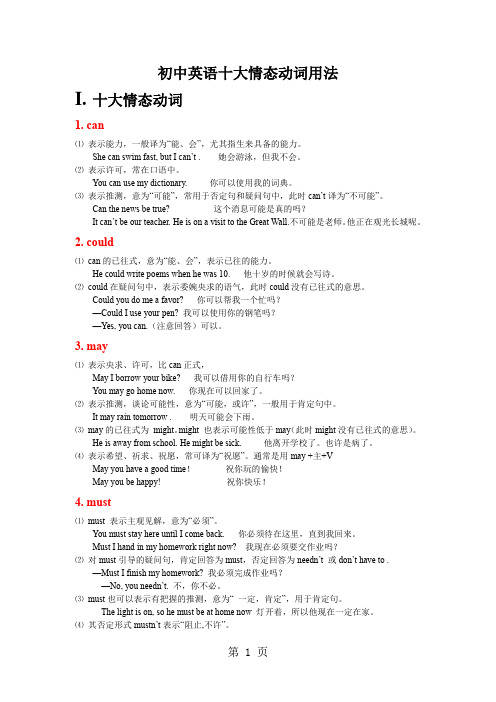
初中英语十大情态动词用法I.十大情态动词1. can⑴表示能力,一般译为“能、会”,尤其指生来具备的能力。
She can swim fast, but I can’t . 她会游泳,但我不会。
⑵表示许可,常在口语中。
You can use my dictionary. 你可以使用我的词典。
⑶表示推测,意为“可能”,常用于否定句和疑问句中,此时can’t译为“不可能”。
Can the news be true? 这个消息可能是真的吗?It can’t be our teacher. He is on a visit to the Great Wall.不可能是老师。
他正在观光长城呢。
2. could⑴can的已往式,意为“能、会”,表示已往的能力。
He could write poems when he was 10. 他十岁的时候就会写诗。
⑵could在疑问句中,表示委婉央求的语气,此时could没有已往式的意思。
Could you do me a favor? 你可以帮我一个忙吗?—Could I use your pen? 我可以使用你的钢笔吗?—Yes, you can.(注意回答)可以。
3. may⑴表示央求、许可,比can正式,May I borrow your bike? 我可以借用你的自行车吗?You may go home now. 你现在可以回家了。
⑵表示推测,谈论可能性,意为“可能,或许”,一般用于肯定句中。
It may rain tomorrow . 明天可能会下雨。
⑶may的已往式为might。
might 也表示可能性低于may(此时might没有已往式的意思)。
He is away from school. He might be sick. 他离开学校了。
也许是病了。
⑷表示希望、祈求、祝愿,常可译为“祝愿”。
通常是用may +主+VMay you have a good time!祝你玩的愉快!May you be happy! 祝你快乐!4. must⑴must 表示主观见解,意为“必须”。
初中英语:情态动词

初中英语:情态动词介绍:情态动词是英语中的一个重要语法点,它们可以用来表示可能性、必要性、责任、建议等等。
在英语口语中,情态动词的使用非常频繁,但是不同的情态动词的用法又各有不同,因此,我们有必要系统地学习情态动词的用法。
本文将为大家详细介绍情态动词的用法,并提供大量的练习题和答案,帮助大家掌握情态动词的用法,让你的英语口语更加流利。
一、情态动词的概念情态动词是指表示说话人对所说内容态度、说话人主观意愿、能力、建议、命令、禁止等的动词。
常用的情态动词有can、could、may、might、must、shall、should、will、would 等九个词。
二、情态动词的用法1.表示能力、许可、建议、命令、禁止等情况1) Can / CouldCan 表示现在或未来有能力做某事;Could 表示过去或未来有能力做某事,或表示委婉语气。
如:I can swim.(我会游泳。
)Could you open the window?(你能帮忙把窗户打开吗?)2) May / MightMay 表示有可能;Might 表示有可能性的弱化。
如:It may rain tomorrow.(明天可能会下雨。
)I might go to the party.(我可能去参加聚会。
)3) MustMust 表示必须,有义务或责任做某事。
如:You must wear a seat belt in the car.(在车上必须系安全带。
)I must finish my homework tonight.(我今晚必须完成作业。
)4) Shall / ShouldShall 表示说话人的意愿,用于提出建议或征求意见;Should 表示应该做某事,并且有义务去做。
如:Shall we go to the cinema tonight?(今晚我们去看电影好吗?)You should stop smoking.(你应该戒烟。
)5) Will / WouldWill 表示意愿、意图和承诺;Would 表示委婉请求和含蓄的建议。
(完整版)初中英语情态动词用法大全

情态动词用法归纳情态动词有can (could), may (might), must, have to, shall (should, will (would), dare (dared), need (needed), ought to等。
情态动词无人称和数的变化;不能单独使用,必须与其后的动词原形构成谓语一、can, could1) 表示能力(体力、知识、技能)。
Can you lift this heavy box?(体力)Mry can speak three languages.(知识)Can you skate?(技能)此时可用be able to代替。
Can只有一般现在时和一般过去式;而be able to则有更多的时态。
I’ll not be able to come this afternoon.当表示“经过努力才得以做成功某事”时应用be able to,不能用Can。
如:He was able to go to the party yesterday evening in spite of the heavy rain.2) 表示请求和允许。
-----Can I go now?----- Yes, you can. / No, you can’t.此时可与may互换。
在疑问句中还可用could,might代替,不是过去式,只是语气更委婉,不能用于肯定句和答语中。
---- Could I come to see you tomorrow?---- Yes, you can. ( No, I’m afraid not. )3) 表示客观可能性(客观原因形成的能力)。
They’ve changed the time table, so we can go by bus instead.This hall can hold 500 people at least.4) 表示推测(惊讶、怀疑、不相信的态度),用于疑问句、否定句和感叹句中。
初中英语语法大全——情态动词
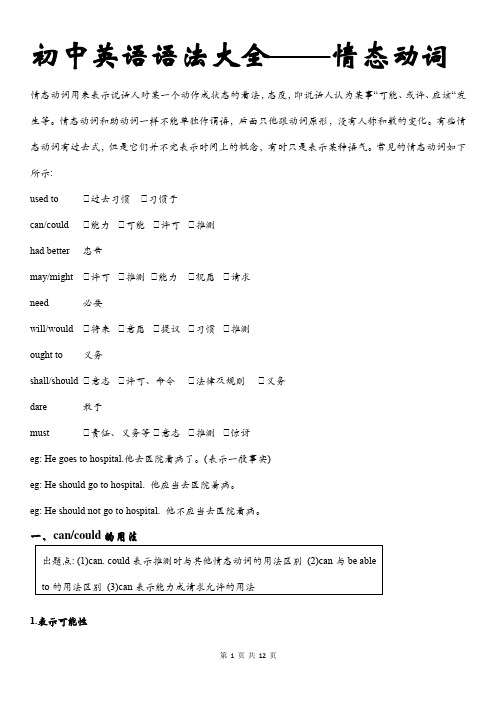
初中英语语法大全——情态动词情态动词用来表示说话人对某一个动作成状态的看法,态度,即说话人认为某事“可能、或许、应该“发生等。
情态动词和助动词一样不能单独作谓语,后面只他跟动词原形,没有人称和数的变化。
有些情态动词有过去式,但是它们并不完表示时间上的概念,有时只是表示某种语气。
常见的情态动词如下所示:used to ①过去习惯②习惯于can/could ①能力②可能③许可④推测had better 忠告may/might ①许可②推测③能力④祝愿⑤请求need 必要will/would ①将来②意愿③提议④习惯⑤推测ought to 义务shall/should ①意志②许可、命令③法律及规则④义务dare 敢于must ①责任、义务等②意志③推测④惊讶eg: He goes to hospital.他去医院看病了。
(表示一般事实)eg: He should go to hospital. 他应当去医院着病。
eg: He should not go to hospital. 他不应当去医院看病。
一、can/could的用法1.表示可能性(1) 表示说话者主观猜测的可能性时, can/could常用于否定句和疑问句中。
could 既可以表示过去的可能性,又可以表示现在的可能性,其语气更弱一些。
Who's the man over there? Is it Mr. Black? 那边那个男人是谁?是布莱克先生吗?--- It can't be him. He's much taller.不可能是他。
他更高一些。
(表示推测时用于否定句)eg: Could he still be alive after all this time? 过了这么长时间,他还可能活着吗? (表示推测时用于疑问句)(2)can用于肯定句中时表示理论上的可能性,即从理论上看有可但实际未必会发生。
有时指一时的情况,常意为“有时会”。
初中英语语法课件 几种情态动词的基本用法

EXERCISES
用适当的情态动词填空
needn’t
1. You
worry about me.
must 2. He looks so pale, he be ill.
3. Plants will die without sunshine.
3.must
表示“必须; 应该” We must finish our homework everyday.
表示“一定”
The book must belong to Jim , there is his name on the cover.
表示“硬要;偏要”
If you must go home, at least call your mom.
7. Students D tell lies. A. may not B. must C. can D. mustn`t
1. You A fail in the exam without hard working. A. will B. would C. mustn‘t D. can
2. He had to give up smoking because of his illness, C he? A. did B. does C. didn’t D. doesn‘t
2. may/might
表示请求、允许、许可, might比may的语气更委婉. 表示推测“可能”, could的可能性比can小。
—May I use the car ? —I’m afraid not. It might not be Jane. She hasn`t dicided to come here yet.
初中英语-情态动词考点总结

被动语态一起使用,给谓语动词增添情态色彩,表示说话人对有
关行为或事物的态度和看法,认为其可能、应该或必要等
一、情态动词的分类
◆情态动词的类型只作情态动词的有:must;can(could); may(might)
◆可作情态动词也可作实义动词的有:need
回答用needn’t。 eg:You needn’t come to school so early. 你不必那么早来学校。
1、表示“必须,应该”。 You must finish your homework by this Friday.
Must的用法
2、must表示推测时一般用于肯定句,意为“一定”。在否定句和疑 问句中一般用can,否定句中也可以用may,但是may not表示 “可能不”,can’t表示“不可能”。
May的用法
(1) 表示推测,意为“可能,也许”。用于肯定句中 eg: He may come tomorrow. 他明天可能回来。
can 和may 一都可以用来表示征求意见和允许,意为 “可以”。一 般可以互换使用。
(2)表示请求,允许。意为“可以”。 eg:May I borrow your book 我可以借用你的书吗?
(5)以can开头的一般疑问句,其肯定形式与否定回答分别用 can和can’t;以could开头的的一般疑问句,其肯定和 否定回答分别用could和couldn’t. Eg: ---could you skate last year? 你去年会滑冰吗? --- Yes, I could./ No, I couldn’t (肯定回答否定回答)
【题组训练】
1、He ____ work hard. 他必须努力工作。
情态动词初中英语

我能打台球
[kæ n] can modal 能够,可能
客观:打雷可能要下雨了
[kʊd] could modal 能够,可能
我能打台球
[kʊd] could modal 能够,可能
主观:我可能打的进去
[meɪ] may modal 可以,也许
你可以借这本书
[meɪ] may modal 可以,也许
情态动词 Modal
主语+
+ 冠词/数词+ 副词+ 形容词 + 名词
[mʌst] must modast modal 必须,一定
这些人一定犯了罪
[niːd] need modal &v.&n. 需要
老爷爷需要帮助
[kæ n] can modal 能够,可能
他也许是图书 管理员
[maɪt] might modal 可以,也许
你可以借这本书
[maɪt] might modal 可以,也许
你可以他借也这许本是书图书 管理员
[ʃæl] shall model 会
假如花缺水,我会给花浇水 当主语是I 和we 时候,过去的人用shall
[wɪl] will model 将会
假如花缺水,我会给花浇水
[wʊd] would model 将会
假如花缺水,我会给花浇水
[ʃud] should modal 应该
我应该把衣服晾在太阳下
初中英语语法情态动词用法大全

情态动词有can (could), may (might), must, have to, shall (should, will (would), dare (dared), need (needed), ought to 等。
情态动词无人称和数的变化;不能单独使用,必须与其后的动词原形构成谓语。
情态动词can 表示能力,意为 “能 会”表示推测, 意为 “可能”, 常用于否定句和疑问句中表示请求, 允许, 意为“可以”个人收集整理 勿做商业用途could 是can 的过去式,意为“能、会”, 表示过去的能力在疑问句中表示委婉请求 may 表示请求、许可,意为“可以”表示推测,常用于肯定句中,意为“可能、也许” might 是may 的过去式,表推测,常用于肯定句中,意为“ 可能、也许 ” must 表示主观看法,意为“必须、应该”表有把握的推测,用语肯定句 Need \表示需要、必须,主要用于否定句和疑问句中 dare 表示敢于,主要用于否定句和疑问句中should 意为“ 应该”, 表示要求和命令表示劝告、建议 had better 意为 “最好”,表示建议 used to 意为 “过去常常,表示过去的动作、行为 考点一 情态动词知识清单情态动词有具体的词义,但也同助动词一样,需要与其他词语一起构成句子的谓语,另外情态动词没哟人称和数的变化,情态动词后必须跟动词原形。
个人收集整理 勿做商业用途 1. can 的用法(1) 表示能力、许可、可能性。
表示能力时一般译为“能、会”, 即有种能力,尤其是生来具备的能力,此时may 和must 均不可代替它。
(2) 表示可能、能够。
如:I can finish it in an hour. 个人收集整理 勿做商业用途 (3)表示许可,常在口语中。
如:You can use my dictionary.(4)表示推测,意为“可能”, 常用于否定句和疑问句中, 此时can’t 译为“ 不可能”。
初中英语语法大全:情态动词

初中英语语法大全:情态动词I. 情态动词基本用法:在英语中主要的情态动词有can (could), may (might), must, have to, need , ought to, dare (dared), shall (should), will (would) .1.情态动词的特征(1)情态动词本身有词义,但词义不完成,因此不能单独作谓语,只能和其他的动词原形一起构成谓语。
(2)情态动词后接的动词不定式一律不带to。
(3)情态支词不随人称变化而变(即不管是何人称,后面接的情态动词都一样)。
(4)含有情态动词的否定都是由“情态动词+not”构成的,如:can-can not may-may not need-need not (5)含有情态动词的疑问句的构成May I come in?我可以进来吗?Can you lend me some money?你能借给我一些钱吗?注意:含有have to 的句子变成疑问句时不同。
如:I have to go today,今天我必须走,Do you have to go today?你今天必须走吗?2.情态动词的用法(1)Can的用法①表示体力或脑力方面的“能力”Can you drive?你会开车吗?Can you speak English?你会说英语吗?Can you lift heavy box?你能将这个重箱子拎起来吗?②表示客观条件允许You can skate on the lake.(The ice is thick enough.)你可以在湖面上滑冰了(冰层够厚的了)The airplane can take off now.(The storm has stopped.)飞机可以起飞了(暴风雨停了)You can’t park your car here.你不能在此停车③can用在否定句和疑问句中时,有时表示说话人的怀疑,惊异、猜测或不肯定:no, no, it can’t be true.不,不,这不可能是事实How can you be so careless!你怎么会这么粗心He can’t be in the library。
初中英语语法专题讲座06——情态动词
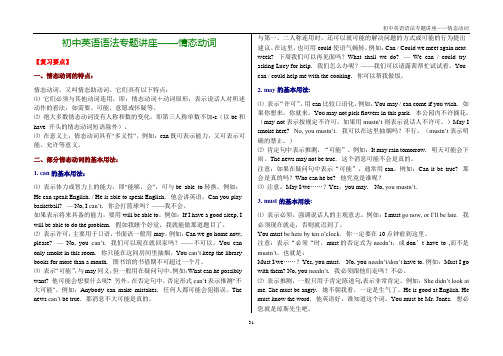
⑵表示许可,主要用于口语,书面语一般用may。例如:Canwe go home now, please? — No, youcan’t.我们可以现在就回家吗?——不可以。Youcanonly smoke in this room.你只能在这间房间里抽烟。Youcan’tkeep the library books for more than a month.图书馆的书借期不可超过一个月。
6.had better的基本用法:
had better常略作’d better。现代语法认为它是一个助动词,因为它后接不带to的动词不定式。had better do sth意思是“最好做某事;还是做某事比较好”。例如:Wehad betterstart at once.我们最好马上出发。You’d betterget some sleep.你最好睡一会儿。You’d better notdo that again.你最好别再做那件事。Whathadwebetterdo now?我们现在怎么做才好呢?Hadn’twebettertell her the truth?我们是否最好不告诉她真相?
8.could, should, would, might表示推测:
①. must多用于肯定句中表示把握性极大的推测,意思为“一定、肯定”。如:You have worked hard all day. You must be tired.你已辛苦工作一整天了,一定累了。The book must be his. His name is on the cover.这本书一定是他的,封面上写着他的名字。
初中英语情态动词详细用法归纳(含练习及答案)
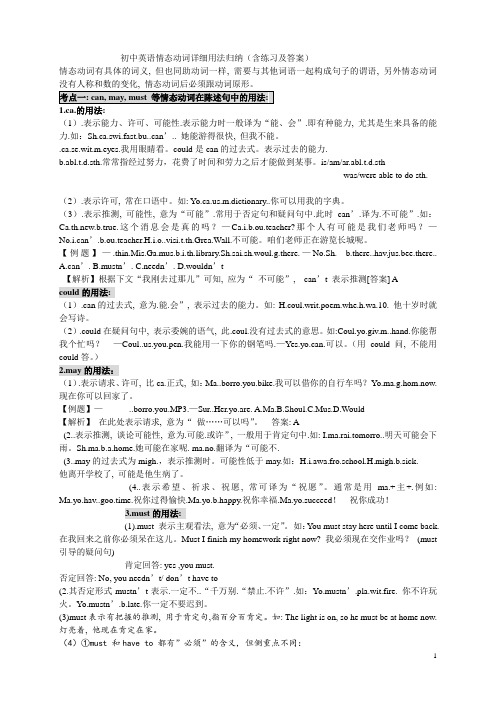
初中英语情态动词详细用法归纳(含练习及答案)情态动词有具体的词义, 但也同助动词一样, 需要与其他词语一起构成句子的谓语, 另外情态动词没有人称和数的变化, 情态动词后必须跟动词原形。
1.ca.的用法:(1).表示能力、许可、可能性.表示能力时一般译为“能、会”.即有种能力, 尤其是生来具备的能力.如:Sh.ca.swi.fast.bu..can’.. 她能游得很快, 但我不能。
.ca.se.wit.m.eyes.我用眼睛看。
could是can的过去式。
表示过去的能力.b.abl.t.d.sth.常常指经过努力,花费了时间和劳力之后才能做到某事。
is/am/ar.abl.t.d.sthwas/were able to do sth.(2).表示许可, 常在口语中。
如: .m.dictionary..你可以用我的字典。
(3).表示推测, 可能性, 意为“可能”.常用于否定句和疑问句中.此时can’.译为.不可能”.如:Ca.th.new.b.true.这个消息会是真的吗?—Ca.i.b.ou.teacher?那个人有可能是我们老师吗?—No.i.can’.b.ou.teacher.H.i.o..visi.t.th.Grea.Wall.不可能。
咱们老师正在游览长城呢。
【例题】—.thin.Mis.Ga.mus.b.i.th.library.Sh.sai.sh.woul.g.there.—No.Sh.__b.there..hav.jus.bee.there..A.can’.B.mustn’.C.needn’.D.wouldn’t【解析】根据下文“我刚去过那儿”可知, 应为“不可能”, can’t 表示推测[答案] Acould的用法:(1).can的过去式, 意为.能.会”, 表示过去的能力。
如: H.coul.writ.poem.whe.h.wa.10. 他十岁时就会写诗。
(2).could在疑问句中, 表示委婉的语气, 此.coul.没有过去式的意思。
初中英语复习18--情态动词

初中英语复习--情态动词ltzzjr情态动词的特点:1.具有一定的意义,但不能单独作谓语其后必须跟动词原形。
2.没有人称和数的变化。
3.时态性不强,可用于过去,现在或将来 .4.可以直接构成否定或疑问。
情态动词的形式:初中要求掌握的情态动词有:can, may, must, could, should, need.一.情态动词的基本用法:can1.表示做某事的能力. “能, 能够”The little boy can sing English songs.The old man can’t carry the heavy box.2.表示允许或请求“可以”All has done. You can go home now.Can I go out with my friends tonight?may1.表示允许. “可以”=canYou may have a rest, then do it.You _____ have a rest, then do it.2.用于一般疑问句中表请求“可以”=canMay I watch TV, mum?_____I watch TV, mum?must表主观看法“必须,一定”.加not “绝不能“You must finish the work today.Boys , you mustn’t play here.could1.表过去的能力“能,会”。
He could swim when he was five.2.用于表请求的问句中代替can,语气更委婉。
Could you help me? (更委婉)Can you help me?should用于发表看法或提出建议“应该”。
In my opinion, you should do it again.You should ask you parents for advice before you do it.need”。
初中英语中考情态动词考点及练习

情态动词【情态动词】又叫情态助动词.它们具有以下特色:⑴它们必须与其他动词连用,即:情态动词+动词本相暗示措辞人对所述动作的意见,如须要.可能.意愿或疑惑等.⑵绝大多半情态动词没有人称和数的变更,即第三人称单数不加-s(以be和have 开首的情态动词短语除外).⑶在意义上,情态动词具有“多义性”.例:can既可暗示才能,又可暗示可能.许可等意义.【情态动词的根本用法】1. can的根本用法:⑴暗示体力或智力上的才能,即“可以或许,会”,可与be able to转换.例:He can speak English. = He is able to speak English.—Can you play basketball?— No, I can’t.假如暗示未来具备的才能,要用will be able to.例:If I have a good sleep, I will be able to do the problem.⑵暗示许可,重要用于白话,书面语一般用may.例:—Can we go home now, please?— No, you can’t.You can only smoke in this room.You can’t keep the library books for more than a month.⑶暗示“可能”,与may同义,但一般用在疑问句中.例:What can he possibly want?在否认句中,否认情势can’t暗示推想“不大可能”.例:Anybody can make mistakes.The news can’t be true.与第一.二人称连用时,还可以就可能的解决问题的方法或可能的行动提出建议.在这里,也可用could 使语气悠扬.例:Can / Could we meet again next week? 下周我们可以再会晤吗?—What shall we do? 我们怎么办呢?— We can / could try asking Lucy for help. ——我们可以请露茜辅佐尝尝看.You can / could help me with the cooking. 你可以帮我做饭.2. may的根本用法:⑴暗示“许可”,用can比较白话化.例:You may / can come if you wish. 假如你想来,你就来.You may not pick flowers in this park. 本公园内不准摘花.(may not暗示按划定不准可,假如用mustn’t则暗示措辞人不准可.)我可以在这里抽烟吗?—.(mustn’t暗示明白的制止.)⑵确定句中暗示推想,“可能”.例:It may rain tomorrow. 明天可能会下雨.The news may not be true. 这个新闻可能不会是真的.留意:假如,通经常应用例:Can it be true? 那会是真的吗?Who can he be? 他毕竟是谁呢?⑶【留意】:……?—Yes, you —No3. must的根本用法:⑴暗示必须,强调措辞人的主不雅意志.例:I must go now, or I’ll be late.You must be here by ten o’clock.【留意】:暗示“必须“时,must的否认式为或而不是mustn’t.也就是:—Must I/we do it now?—Yes, you—No, you例:—Must I go with them?—No, you .⑵暗示推想,一般只用于确定陈述句,暗示异常确定.例:She didn’t look at me. She must be angry. 她不朝我看,必定是朝气了.He is good at English. He must know the word. 他英语好,准知道这个词.You must be Mr. Jones. 想必您就是琼斯师长教师吧.4. have to的根本用法:have to可视为情态动词,但它与其他情态动词在用法上稍有不合.其他情态动词没有人称和数的变更,而have to却有人称和数的变更,要视主语的不合而变更.例:I / You / We / They have to….He / She / It has to….You don’t have to….Does she have to…?意思是“必须,不克不及不”.和must不合之处:must强调主不雅须要have to强调客不雅须要.例:Sorry, I have to leave now. 对不起,如今我得走了.I’ve got to go to a meeting. 我得去介入一个会议.Will he have to work deep into the night? 他将不克不及不工作到深夜吗?5. need的根本用法:need的根本词义是“须要”,它既可作情态动词,又可作实义动词.⑴ need用作情态动词时,只用于否认句和疑问句.它只有一种情势,后接动词本相.例:I don’t believe you need worry. 我信任你没有须要着急.—Need we go so soon? 我们须要这么早就去吗?— Yes, we must. / No, we needn’t. 是的,必须./不,不必.So I needn’t tell him, need I? 所以我不须要告知他,对吧?请比较以下两句话的不合意思:You needn’t buy the coat. 你没有须要买那件外套.(你还没买)You needn’t have bought the coat. 你没有须要买这件外套的.(而你却买了)【留意】:……?—Yes,you —No, you⑵need,有时态.人称和数的变更.假如人作主语,一般后接带to的动词不定式.即假如物作主语,一般后用例如:I need to look up this word in the dictionary.My watch needs mending/to be mended. 我的手表须要补缀了.We don’t need to work today. (= We needn’t work today.)Does he need to go right now? (= Need he go right now?)6. had better的根本用法:had bette r常略作’d better.现代语法以为它是一个助动词,因为它后接不带to的动词不定式.意思是“最好做某事;照样做某事比较好”.例:You’d better get some sleep. 你最好睡一会儿.You’d better not do that again. 你最好别再做那件事.What had we better do now? 我们如今怎么做才好呢?Hadn’t we better tell her the truth? 我们是否最好不告知她本相?7. could, should, would, might暗示推想:①.must多用于确定句中暗示掌控性极大的推想,意思为“必定.确定”.如: You have worked hard all day. You must be tired. 你已辛劳工作一成天了,必定累了.The book must be his. His name is on the cover. 这本书必定是他的,封面上写着他的名字.【留意】 must不表推想时,在确定句中意思为“必须(强调内涵的职责)”,在否认句中意思为“不准.制止”,以它开首的疑问句否认答复经常应用needn’t或don’t (doesn’t) have to.如:We must obey the traffic rules. 我们必须遵照交通规矩.Cars mustn’t be parked here. 此处严禁泊车.—Must we hand in the papers this week? 我们必须本礼拜交论文吗?—No, you needn’t. 不,你们不必(本礼拜交).②. can / could多用于否认句.疑问句或感慨句中暗示推想.疑惑,两者在时光上没有不同.用can时不信任的程度更强一些,如:The man under the tree can’t be Tom. He’s gone to England.这小我不成能是Tom,他已经去英国了.Can it be true that he was fooled by a five-year-old boy? 他被一个五岁的孩子愚弄了,这能是真的吗?Could this be an excuse? 这会不会是个托言?How can you be so careless! 你怎么如许粗心!③.may / might多用来暗示掌控性不大的推想,意思为“也许.可能”, might比may的掌控性更小一些.留意区分“不成能”与“可能不”在掌控性大小上的差别.) 如:Mr. Wang may know Professor Li’s telephone number.王师长教师也许知道李传授的德律风号码.This might be the key Tom has been looking for.这可能就是汤姆一向在找的钥匙.She may not be there today. 今天她可能不在那儿.一、典范例题【中考链接】()1.—Who is the man over there? Is it Mr. Li?— No, it ______ be him. Mr. Li is much taller.A. mustn’tB. may noC. can’tD. needn’t()2.—Must I go with them tomorrow?— No,you ______.A. mustn'tB. shouldn'tC. needn'tD. can't()3.—______ I take some photos in the hall?— No, you ______.A. Can, needn’tB. Must, mustn’tC. Could, won’tD. May, mustn’t()4.—Dad, must I finish my homework today?—No, you ________. You may do it tomorrow.A. needn’tB. mustn’tC. don’tD. won’t()5.—The lake is said to be dry. Is that true?—It _______.Look, some kids are swimming in it.A. must be trueB. can’t be trueC. may not be true()6.—What is your mother going to do this Saturday?—I’m not sure. She _____ go to see my grandmother.A. canB. mustC. may()7.—Susan has bought a large house with a swimming pool.—It ______ be very expensive. I never even dream about it.A. mustB. mightC. can’tD. shouldn’t()8.—Listen! Is Professor Johnson giving a report in the hall?—No, it be him. He has gone to Japan.A. needn’tB. may notC. mustn’tD. can’t()9.—Let’s go to the West Hill Park by taxi.—Oh, it is not far away from here. We _______take a taxi.A. couldn’tB. mustn’tC. needn’tD. can’t()10.—Can you play the piano?—Yes, I _______. I often practice it on weekends.A. needn’tB. needC. can’tD. can三.课后演习一.用can, may, must, need, have to, had better的恰当情势填空:1.You ________________ return the library book on time.2.I ______________ (not) find the way to the hospital. _______________ you show me the way?3.—________________ I finish the work right now?— No, you ________________ (not). You ____________ do it later.4.He said he ________________ (not) come tonight.5.Her mother was ill. She ________________ stay at home and look after her.6.It’s time for class. You ________________ stop playing football or you __________be late for class.7.We ________________ start right now, or they would get there first.8.The cloud is lifting, so it ________________ (not) be a rainy day tomorrow.二.选择填空()1.—Do we have to finish our homework this afternoon?—Yes, you ________.A. mustB. canC. mayD. need()2. —Must I be in hospital for a week, Doctor?—No, you . You can go back home tomorrow.A.mustn’tB. needn’tC. must()3. The desk is not dirty. You _______clean it.A. mustn’tB. shouldn’tC. needn’t C. can’t()4. —May I watch TV for a while?—No, you _______. You have to finish your homework first.A. shouldn’tB. needn’tC. mustn’tD. won’t()5.—Is Jessica giving us a speech this evening?—No, it ________be her. She________ to Japan.A. mustn’t; has goneB. mustn’t ;has beenC. can’t ;has goneD. can’t ;has been()6. It’s the library! So you________ know shouting is not allowed here.A. canB. mustC. needD. may()7. Boys and girls, don’t forget your report . It ______ today.A. can’t finishB. can’t be finishedC. should finishD. should be finished()8.—Mr Smith must have been to your home this morning.—No, he ______ ,because he didn’t know my address.A. couldn’tB. can’tC. mustn’tD. may not ()9. —Must I mop up the window now?—No, you________.A.needn’tB. can’tC. shouldn’tD. mustn’t()10. —Is Lucy knocking at the door?—No. It ________ be Lucy. She is in Japan now.A. needn’tB. mustC. can’t()11. —Another cup of coffee?—No, thanks. I _____ be off. Mary is waiting for me.A. canB. mayC. mustD. might()12. —I’m a little tired. Let’s go to the zoo by taxi.—We take a taxi. It’s not far from here.A. can’tB. mustn’tC. couldn’tD. needn’t()13. If the traffic light is red, you ________ cross the road. It’s very dangerous.A. don’tB. mustn’tC. needn’tD. wouldn’t()14. —Must I finish watering the flowers now?—No, you________.A. mustB. won’tC. needn’tD. can’t()15. —I can’t give up smoking, doctor.—For your health, I’m afraid you ________.A. mayB. canC. have toD. must。
初中资料英语情态动词有哪些
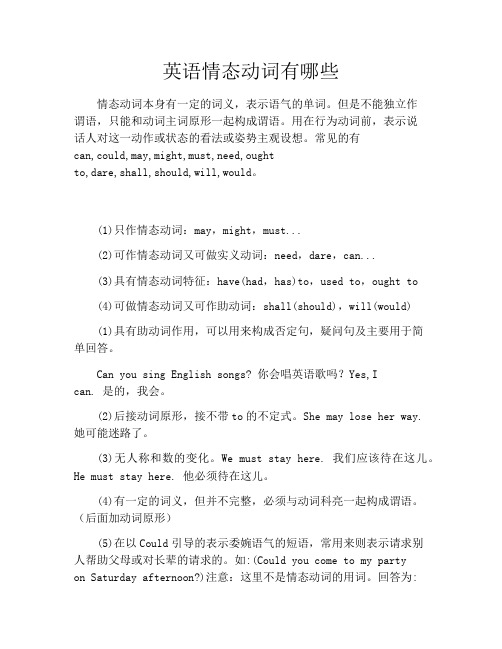
英语情态动词有哪些情态动词本身有一定的词义,表示语气的单词。
但是不能独立作谓语,只能和动词主词原形一起构成谓语。
用在行为动词前,表示说话人对这一动作或状态的看法或姿势主观设想。
常见的有can,could,may,might,must,need,oughtto,dare,shall,should,will,would。
(1)只作情态动词:may,might,must...(2)可作情态动词又可做实义动词:need,dare,can...(3)具有情态动词特征:have(had,has)to,used to,ought to(4)可做情态动词又可作助动词:shall(should),will(would)(1)具有助动词作用,可以用来构成否定句,疑问句及主要用于简单回答。
Can you sing English songs? 你会唱英语歌吗?Yes,Ican. 是的,我会。
(2)后接动词原形,接不带to的不定式。
She may lose her way. 她可能迷路了。
(3)无人称和数的变化。
We must stay here. 我们应该待在这儿。
He must stay here. 他必须待在这儿。
(4)有一定的词义,但并不完整,必须与动词科亮一起构成谓语。
(后面加动词原形)(5)在以Could引导的表示委婉语气的短语,常用来则表示请求别人帮助父母或对长辈的请求的。
如:(Could you come to my partyon Saturday afternoon?)注意:这里不是情态动词的用词。
回答为:肯定:Yes,I can./Sure./Certainly.否定:Sorry,I am afraid not.(在作否定回答时,要注意:在拒绝男方的请求时,不能用can not,这样显得言语太过生硬,不礼貌。
但是在长辈拒绝晚辈的请求是可以用can not的。
)。
初中英语语法:情态动词讲解及练习
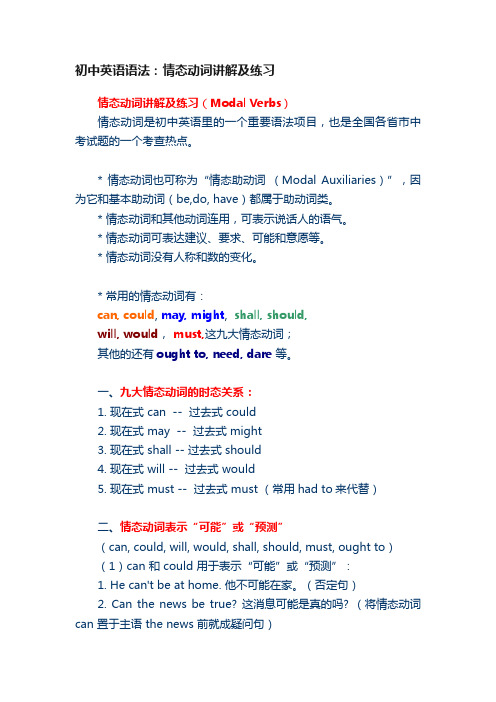
初中英语语法:情态动词讲解及练习情态动词讲解及练习(Modal Verbs)情态动词是初中英语里的一个重要语法项目,也是全国各省市中考试题的一个考查热点。
* 情态动词也可称为“情态助动词(Modal Auxiliaries)”,因为它和基本助动词(be,do, have)都属于助动词类。
* 情态动词和其他动词连用,可表示说话人的语气。
* 情态动词可表达建议、要求、可能和意愿等。
* 情态动词没有人称和数的变化。
* 常用的情态动词有:can, could, may, might, shall, should,will, would,must,这九大情态动词;其他的还有ought to, need, dare等。
一、九大情态动词的时态关系:1. 现在式 can -- 过去式 could2. 现在式 may -- 过去式 might3. 现在式 shall -- 过去式 should4. 现在式 will -- 过去式 would5. 现在式 must -- 过去式 must (常用had to来代替)二、情态动词表示“可能”或“预测”(can, could, will, would, shall, should, must, ought to)(1)can 和 could 用于表示“可能”或“预测”:1. He can't be at home. 他不可能在家。
(否定句)2. Can the news be true? 这消息可能是真的吗? (将情态动词can 置于主语 the news 前就成疑问句)3. Anybody can make mistake. 任何人都可能犯错误。
(只表示理论上的可能性)(2)may 和 might 用于表示“事实上的可能性”或“预测”:1. It may rain tomorrow. (表示可能会发生)明天可能会下雨。
2. It may snow later this afternoon. (表示预测)今天下午可能会下雪。
- 1、下载文档前请自行甄别文档内容的完整性,平台不提供额外的编辑、内容补充、找答案等附加服务。
- 2、"仅部分预览"的文档,不可在线预览部分如存在完整性等问题,可反馈申请退款(可完整预览的文档不适用该条件!)。
- 3、如文档侵犯您的权益,请联系客服反馈,我们会尽快为您处理(人工客服工作时间:9:00-18:30)。
初中英语语法情态动词知识
can表示能力,意为“能会”
表示推测,意为“可能”,常用于否定句和疑问句中
表示请求,允许,意为“可以”
could can的过去式,意为“能、会”,
表示过去的能力,在疑问句中表示委婉请求
may表示请求、许可,意为“可以”
表示推测,常用于肯定句中,意为“可能、也许”might may的过去式
表示推测,常用于肯定句中,意为“可能、也许”must表示主观看法,意为“必须、应该”
表示有把握的推测,用语肯定句
need表示需要、必须,主要用于否定句和疑问句中dare表示敢于,主要用于否定句和疑问句中should意为“应该”,表示要求和命令
表示劝告、建议
had better意为“最好”,表示建议
used to意为“过去常常,表示过去的动作、行为。
